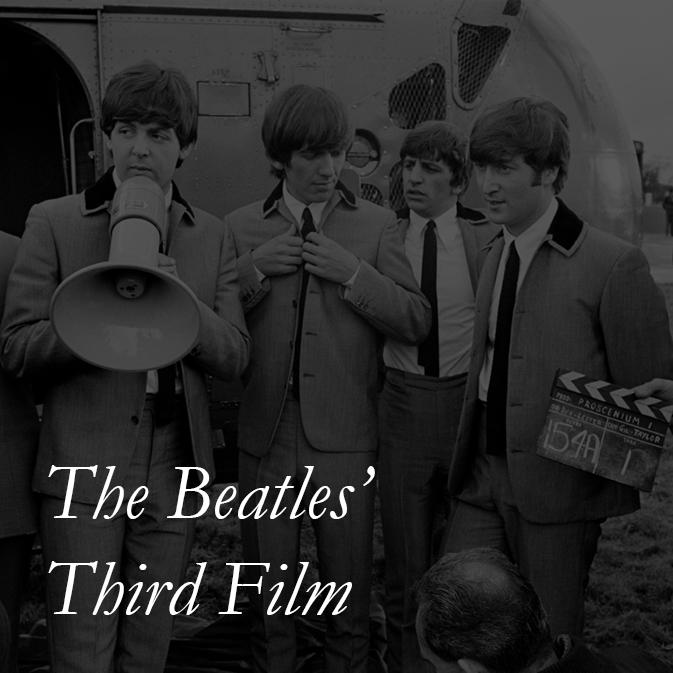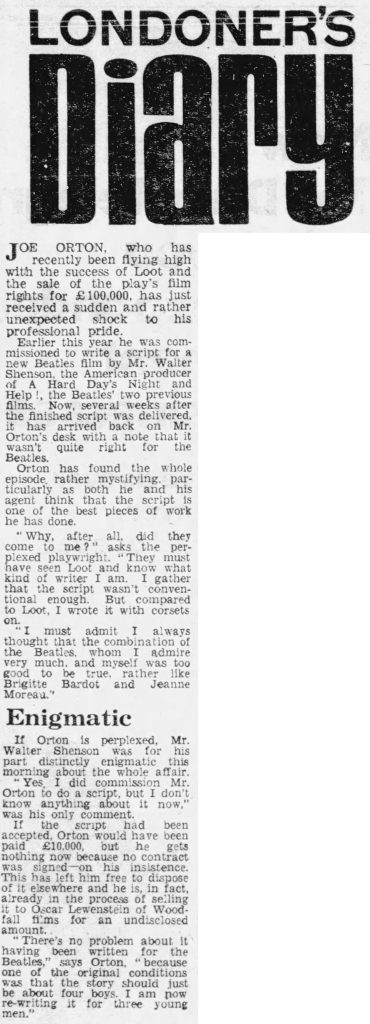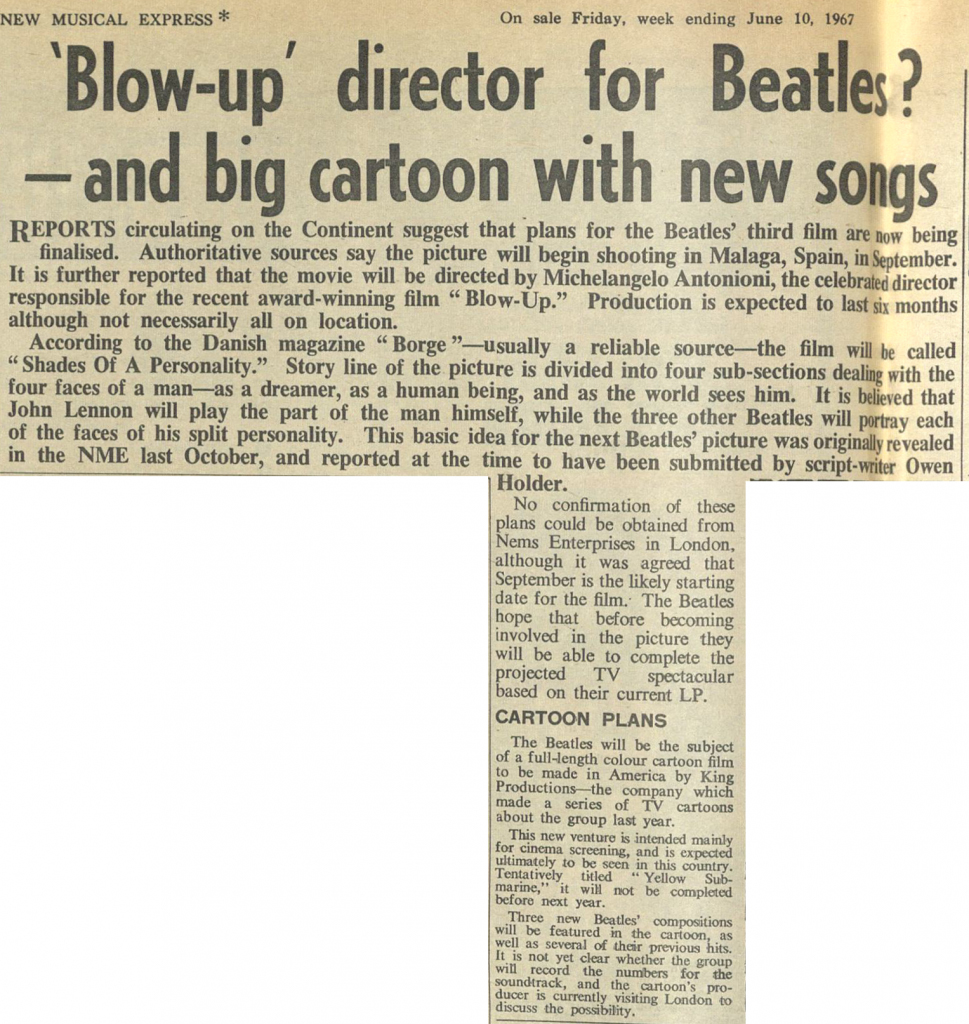
Tuesday, April 4, 1967
Joe Orton’s script for the Beatles’ third film is rejected
Last updated on December 22, 2023

Tuesday, April 4, 1967
Last updated on December 22, 2023
Session Apr 03, 1967 • Recording and mixing "Within You Without You"
Article April 03-04, 1967 • Paul McCartney and Mal Evans fly to San Francisco
Article Apr 04, 1967 • Joe Orton's script for the Beatles' third film is rejected
Session Apr 04, 1967 • Mixing "Within You Without You"
Article Apr 05, 1967 • Paul McCartney celebrates Jane Asher's 21st birthday in Denver
The Beatles discuss their third film project
Dec 13, 1965
In 1967, The Beatles were still under contractual obligation to make a third film for United Artists, following the success of their previous films, “A Hard Day’s Night” (1964) and “Help!” (1965).
Throughout 1966, producer Walter Shenson considered various scripts, but none was deemed suitable. In July 1966, it was announced that The Beatles had retained a script by British playwright Owen Halder. The script, named “Shades of a Personality“, called for a man (to be played by John Lennon) suffering from a three-way split personality, with the remaining Beatles playing each of these personalities. However, the project was eventually scrapped.
In January 1967, English playwright Joe Orton was contacted by Walter Shenson to revisit “Shades of a Personality.” Orton was well-known in the London theatre scene and had received a £1,000 investment from Paul McCartney for his play “Loot.” Brian Epstein, The Beatles’ manager, believed that Orton would be a great fit for writing a film for the band.
Orton spent January and February working on a script called “Up Against It“. He documented his progress and interactions with The Beatles’ team in his diary. On January 24, 1967, he met with Paul McCartney and Brian Epstein to discuss the project. However, his script was ultimately rejected, and he was informed of this on April 4.
The reason why we didn’t do Up Against It wasn’t because it was too far out or anything. We didn’t do it because it was gay. We weren’t gay and really that was all there was to it. It was quite simple, really. Brian was gay… and so he and the gay crowd could appreciate it. Now, it wasn’t that we were anti-gay – just that we, The Beatles, weren’t gay.
Paul McCartney
Monday 6 March – […] Went to Peggy’s office. We decided to send Shenson Up Against It. No point in hanging on to it. Tried to get in touch with him with no success. I said I’d try later on in the morning. Came home. Went to Shenson’s office at 2.30 and delivered the script. He was very surprised to get it so soon. He’s off to California in the morning. Epstein is in New York but will be back next week. Shenson said he’d ring me tomorrow morning about ten-ish. He’s going to read the script tonight. Peggy said she feels it will be too much for him. […]
Tuesday 7 March – […] Shenson rang this’ morning. He’d read only half the script (to the prison sequence) and confessed to finding it ‘fascinating’. I gather, though, that he’s jittery. He also thinks that either it should be made much clearer that the four boys are merely aspects of one person or, as I suggested, that there are four boys. He’s worried by the fact that, as the script goes at the present time, it would be impossible for there to be only one boy. He’s obsessed by the fact that ‘as you know, Joe, we’re all of us different people. And we have to learn to live with those aspects. I understood that the original idea was to show how a man came to live with himself.’ Which I think is pretentious shit. I can’t write that or, what is more important, alter my script to fit in with that idea. Ed much rather have it about four boys anyway. Shenson is going to speak to Epstein from Los Angeles tonight. He has suggested Antonioni to direct. Rubbish! […]
Wednesday 29 March – […] Easter celebrations over. Feel in a better mood. Rang Peggy about the Beatles’
film script. She promised to write a letter to Shenson. The real trouble, she feels, is Epstein. An amateur and a fool. He isn’t equipped to judge the quality of a script. Probably he will never say ‘yes’, equally hasn’t the courage to say ‘no’. A thoroughly weak, flaccid type. Oscar is keen to do the script of Up Against It. He probably would do it better anyway. Extraordinary the way someone like Epstein has absolutely no idea how valuable a property the Beatles are. Having commissioned a script he can waste time until it is taken from him. He’ll then be back
at square one with the original script (which was dull and of no interest), or faced with the job of commissioning another script from another author. […]Tuesday 4 April – […] Rang Peggy to ask about Up Against It. She says that Shenson’s secretary rang to tell her that the script would be sent back. No explanation of why. No criticism of the script. And, apparently, Brian Epstein has no comment to make either. Fuck them. […]
Joe Orton – The Orton Diaries, 1986
LONDONER’S DIARY
JOE ORTON, who has recently been flying high with the success of Loot and the sale of the play’s film rights for £100,000, has just received a sudden and rather unexpected shock to his professional pride.
Earlier this year he was commissioned to write a script for a new Beatles film by Mr. Walter Shenson, the American producer of A Hard Day’s Night and Help!, the Beatles’ two previous films. Now, several weeks after the finished script was delivered, it has arrived back on Mr. Orton’s desk with a note that it wasn’t quite right for the Beatles.
Orton has found the whole episode, rather mystifying, particularly as both he and his agent think that the script is one of the best pieces of work he has done.
“Why, after all. did they come to me?” asks the perplexed playwright. “They must have seen Loot and know what kind of writer I am. I gather that the script wasn’t conventional enough. But compared to Loot, I wrote it with corsets on. I must admit I always thought that the combination of the Beatles, whom I admire very much, and myself was too good to be true, rather like Brigitte Bardot and Jeanne Moreau.”
If Orton is perplexed, Mr. Walter Shenson was for his part distinctly enigmatic this morning about the whole affair. “Yes. I did commission Mr. Orton to do a script, but I don’t know anything about it now,” was his only comment. If the script had been accepted, Orton would have been paid £10.000, but he gets nothing now because no contract was signed — on his insistence. This has left him free to dispose of it elsewhere and he is, in fact, already in the process of selling it to Oscar Lewenstein of Woodfall films for an undisclosed amount.
“There’s no problem about it having been written for the Beatles,” says Orton, “because one of the original conditions was that the story should just be about four boys. I am now re-writing it for three young men.”
From London Evening Standard, April 10, 1967

From Wikipedia:
Up Against It is an unproduced script by Joe Orton, written in 1967 for The Beatles at the height of their fame.
Background
Orton’s screenplay was a revised version of a 1966 script called Shades of a Personality, by Owen Holder, which producer Walter Shenson wanted Orton to “punch-up”, in his words; Orton incorporated portions of this prior draft, but used, as the opening of the story, a concept he and his companion Kenneth Halliwell had explored in a now-lost novel from 1957, The Silver Bucket. The story’s skeleton also borrowed liberally from Orton’s final novel, written in 1959, called The Vision of Gombold Provol (posthumously published as Head to Toe).
After a proper contract had been drawn up, allowing Orton to buy back the rights to his script should it be refused, Orton submitted the script to the Beatles’ manager, Brian Epstein; after a long period of silence, his screenplay was returned to him without comment.
Orton further revised Up Against It after this event, paring down the four leads to three (mainly by combining the George and Ringo parts). Producer Oscar Lewenstein accepted the script, considering Mick Jagger and Ian McKellen for two of the leads. Lewenstein and Orton planned a meeting with director Richard Lester at Twickenham Film Studios to discuss filming options on the script. On the morning the chauffeur arrived to take Orton to the meeting, he discovered him and Halliwell dead inside their home. Halliwell had bludgeoned Orton to death with a hammer and then committed suicide with an overdose of Nembutal tablets.
Synopsis
The screenplay begins with the expulsion from a provincial town of two young men of no fixed ambition, Ian McTurk and Christopher Low; Ian is a sexually profligate charmer, Low quixotic and pure of heart. They are banished because Ian has deflowered Rowena Torrence, niece of the local high priest, Father Brodie; present to see them off are amiably opportunistic Mayor Terence O’Scullion, sexually dangerous police official Connie Boon (“rhymes with loon”, the Mayor says), and plain-Jane secretary Miss Patricia Drumgoole, who is desperately in love with Ian.
Wandering the woods outside of town, Christopher meets and winds up at the mansion of eccentric millionaire Bernard Coates; also present at the mansion is the sinister Connie, who frightens the innocent Low into sexual slavery. Meanwhile, Ian has fled the scene, enraged by Miss Drumgoole’s revelation that Rowena is to marry Coates. He comes upon a group of anarchists led by Jack Ramsay, a rootless troublemaker whose plan is to assassinate the new (female) Prime Minister. Also in Ramsay’s ragged cadre are the deposed Mayor, embittered kept boy Christopher, and Miss Drumgoole, now a government clerk out to commit sabotage.
Jack, Ian, and Christopher affect female drag to gain entrance to the Royal Albert Hall, where Jack guns down the PM. They escape. Later, Jack disrupts the Prime Minister’s funeral march with a speech in favor of public debauchery and an end to private perversion. The crowd finds this notion not merely sensible but appealing. A riot ensues, and the three hide out in the newsagent’s shop of Jack’s wizened anarchist father. Ian is lured away by the treacherous Rowena, and captured; Jack and Christopher are cornered by police and shot down.
For the next ten years Ian languishes in prison before being liberated by the miraculously still-living and patiently tunnel-digging Jack. They escape through a sewer and into the sea, where they are pulled into a luxury yacht attended by none other than Christopher Low, who is cabin boy to the now-married Rowena and Coates. A mad tea party follows, attended by all three heroes, Rowena, Coates, the Mayor and his wife, and Miss Drumgoole. Ian again tries and fails to seduce Rowena; while Miss Drumgoole, still in love with Ian, throws herself overboard when he rejects her. Before they can be arrested, Jack, Ian, and Christopher abscond in the lifeboat; they find Miss Drumgoole adrift, then become caughat in a storm.
Ian awakens on a beach and is taken to a hospital, where Connie reappears to draft him into the war now being fought between government and rebel forces. At the recruitment center he reunites with Jack and Christopher, who convince him to go over to the rebels. The three go off to battle, where Ian is wounded and they again cross paths with Miss Drumgoole. The Mayor turns up, as does Jack’s father; sides are switched again, and still again. Finally the bickering crew crash their stolen ambulance into a lorry carrying wounded — and in an epic disaster scene, a series of escalating conflagrations climaxes in the opening of the earth itself to swallow the dead, the dying, the wounded, and even their scurrying medics. At which point Father Brodie materializes, surrounded in sepulchral procession by the chants and prayers of the faithful, to bless the hellish battlefield. Ian sobs, Christopher kneels in spiritual surrender, and Jack loses his mind.
All are taken prisoner — only to be given medals and honored as heroes: their initial ambulance crash, it seems, resulted in the winning of the war and defeat of the rebels. Jack’s anarchist father is now a decorated general; the Mayor has been restored to power; and Christopher is engaged to Connie. But in a welter of last-minute reversals, the world is set off-balance yet again. Christopher, appalled once too often by Connie’s virulent sexism, calls off their engagement; Jack’s father finds himself demoted to hotel bellhop; and Ian, though he still loves Rowena, offers himself to the faithful Miss Drumgoole. (“My heart is broken, but everything else is in working order.”) She accepts the proposal of marriage — to all three heroes. Ian, Jack, and Christopher wed Miss Drumgoole in a Mass officiated by Father Brodie and attended by the whole happy cast, and the screenplay ends with bride and grooms in polygamous morning-after intimacy, disappearing with squeals of delight under the conjugal sheets. […]
‘Blow-up’ director for Beatles? – and big cartoon with new songs
REPORTS circulating on the Continent suggest that plans for the Beatles’ third film are now being finalised. Authoritative sources say the picture will begin shooting in Malaga, Spain, in September. It is further reported that the movie will be directed by Michelangelo Antonioni, the celebrated director responsible for the recent award-winning film “Blow-Up.” Production is expected to last six months although not necessarily all on location.
According to the Danish magazine “Borge” — usually a reliable source — the film will be called “Shades Of A Personality.” Story line of the picture is divided into four sub-sections dealing with the four faces of a man — as a dreamer, as a human being, and as the world sees him. It is believed that John Lennon will play the part of the man himself, while the three other Beatles will portray each of the faces of his split personality. This basic idea for the next Beatles’ picture was originally revealed in the NME last October, and reported at the time to have been submitted by script-writer Owen Holder.
No confirmation of these plans could be obtained from Nems Enterprises in London, although it was agreed that September is the likely starting date for the film. The Beatles hope that before becoming involved in the picture they will be able to complete the projected TV spectacular based on their current LP.
CARTOON PLANS
The Beatles will be the subject of a full-length colour cartoon film to be made in America by King Productions — the company which made a series of TV cartoons about the group last year. This new venture is intended mainly for cinema screening, and is expected ultimately to be seen in this country. Tentatively titled “ Yellow Submarine,” it will not be completed before next year. Three new Beatles’ compositions will be featured in the cartoon, as well as several of their previous hits. It is not yet clear whether the group will record the numbers for the soundtrack, and the cartoon’s producer is currently visiting London to discuss the possibility.
From New Musical Express – June 10, 1967

The Beatles Diary Volume 1: The Beatles Years
"With greatly expanded text, this is the most revealing and frank personal 30-year chronicle of the group ever written. Insider Barry Miles covers the Beatles story from childhood to the break-up of the group."
We owe a lot to Barry Miles for the creation of those pages, but you really have to buy this book to get all the details - a day to day chronology of what happened to the four Beatles during the Beatles years!

Notice any inaccuracies on this page? Have additional insights or ideas for new content? Or just want to share your thoughts? We value your feedback! Please use the form below to get in touch with us.